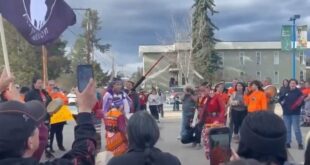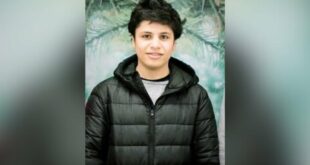The term 'atitsak' acknowledges a deep, spiritual relationship between family members
This First Person column is written by Tama Fost, who lives in St. John's. For more information about CBC's First Person stories, please see the FAQ.
Ullukut ilonnasi. Tamauvunga — good day all of you. I am Tama.
I was born and raised in downtown St. John's. My settler dad, Fred, was from Millertown, N.L., while my Inuk mom, Charlotte, is from Hopedale, Nunatsiavut (north coastal Labrador).
Although I'm a Newfoundlander and Labradorian, I am the first generation of my Inuit family lineage to have
been born and raised in a city — a first-generation urban Inuk, if you will.
A person's name is an identifier — inwardly, as well as externally to others and the community to which they belong. After the arrival of Moravian missionaries in Nunatsiavut, traditional Inuit names faded and began to reflect biblical and Westernized names, although it is still common to name a newborn after a family member or loved one. The term atitsiak is used to acknowledge the revered relationship shared between two individuals.
So what's in a name, exactly, and what significance does naming and atitsiak hold to Inuit? I will get to that, but first I would like to share a little about my name.
To be named
I was born in the mid-1980s, and I am told I was a few weeks old before my parents agreed upon a name. For the nameless weeks, I was simply called "the baby." Eventually they decided on Tama Stephanie Margaret: Tama after my anânsiak (maternal grandmother), Stephanie because they liked the name, and Margaret after my dad's youngest sister, who passed away as a baby.
I was baptized Tama. However, my parents raised me as Stephanie, and this was my primary name until I became a mother.

My anânsiak was born and raised in Hopedale with Inuktitut as her first language. She gave birth to 12 children, eight of whom survived and were raised in Hopedale with her husband, Natan — my atâtsiak (grandfather). While raising my mom and her siblings, my anânsiak worked as a cook and nurse's aide. She was kind and quiet and, like many Inuit women, she had an insurmountable knowledge of genealogy and lineage. You needed only to say a person's name, and she would be able to tell you who their parents were, who their parents' parents were, and who their parents' parents' parents were. And from my earliest memories with her, she always lovingly called me atitsiak.
As a small girl, I didn't know or hear much Inuktitut unless I was at my grandparents' house in Happy Valley-Goose Bay, N.L. I sort of just assumed that atitsiak meant "grandchild," but I remember asking my mom at a young age why Anânsiak only called me atitsiak. She told me that atitsiak can be loosely translated to mean "namesake."
As I grew, I learned that atitsiak is more than merely sharing a name. It is much deeper, complex and spiritual. Like many aspects of Inuit culture and spirituality, atitsiak is neither linear nor one-directional. It is a term my anânsiak could call me, and a term I too could call her.

The fight to reclaim traditional Indigenous names
1 year ago
Featured VideoSome Indigneous people are facing difficulties reclaiming their traditional names as Indigenous symbols are still excluded from being printed on birth certificates and health cards in some provinces and territories.
There is an element of sharing and reciprocity wherein names are inherited from one or more generation to another. When a baby is named after their grandfather, the parent might lovingly call the baby atâtak, which means "father," or ittok, which means "old man."
Some believe the baby will inherit similar characteristics of the older individual, especially when the elder has passed away. Because there is an inheritance of personality characteristics, it's almost as though there is a migration or continuance of spirit. The child must give honour and reverence to their atitsiak and the importance of namesake relationship.
Motherhood
When I became a mother I felt a sense of urgency in deepening my connection, exploration and celebration of my Inuit roots. I started spending more time with the urban Inuit community and began learning some Inuktitut, drum dancing and throat singing. If I did not honour my Inuit roots, I feared my future grandchildren would lose even more Inuit culture, knowledge and spirituality than what was lost between my anânsiak's generation and mine. In the early days of motherhood, I embraced Tama as my primary name to honour being atitsiak to my anânsiak.
The atitsiak relationship in my family is not just limited to myself and my anânsiak. It permeates through many generations in our family tree. There are dozens of examples, and I named my dear son after my dad, who sadly passed away before his first grandchild was born.
Although my dad was a settler, I named my son after him to honour the atitsiak tradition while acknowledging the Inuit and settler roots in my lineage. As my son grows, he reminds me of my dad in many ways, whether it's the way he walks across a room or his passion for music. It's no surprise I will call my son atâtak or ittok from time to time. Although he didn't have the chance to meet my dad, my son truly is atitsiak to his grandfather, who we call Poppy, in mannerisms, name and spirit.
So for now, I leave you with this question: is the notion of atitsiak merely just sharing a name? I'll let you decide.
But for me, embracing Tama as my first name and continuing the atitsiak tradition with my son are conscious acts of decolonization and reclamation of our Inuit identity, not to mention an honour to hold in great reverence in mind, body and spirit.
Do you have a compelling personal story that can bring understanding or help others? We want to hear from you. Here's more info on how to pitch to us.
Download our free CBC News app to sign up for push alerts for CBC Newfoundland and Labrador. Click here to visit our landing page.
ABOUT THE AUTHOR
Freelance contributor
Tama Fost is a writer and an Indigenous student success co-ordinator at Memorial University in St. John's.
*****
Credit belongs to : www.cbc.ca
 MaharlikaNews | Canada Leading Online Filipino Newspaper Portal The No. 1 most engaged information website for Filipino – Canadian in Canada. MaharlikaNews.com received almost a quarter a million visitors in 2020.
MaharlikaNews | Canada Leading Online Filipino Newspaper Portal The No. 1 most engaged information website for Filipino – Canadian in Canada. MaharlikaNews.com received almost a quarter a million visitors in 2020.







